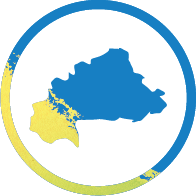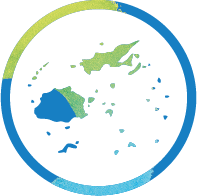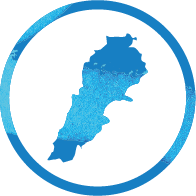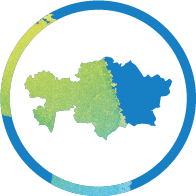Special Contributions
Introduction
Special contributions are first-hand written accounts of a contributor’s perspective on volunteering. The contributions for the 2022 State of the World’s Volunteerism Report focus on volunteer-state partnerships, the subject of the report. Contributors provide their reflections on volunteer-state partnerships and share their perspectives on how partnerships can help tackle ongoing societal challenges, and how volunteerism could address emerging challenges, and contribute to building a fairer world.
Contributors
- Government
- Civil Society Organization
- Private Sector
- United Nations Partners
Bangladesh
Asia and the Pacific
MD Tazul Islam MP, Honourable Minister of Local Government Rural Development and Cooperatives, Bangladesh.
Burkina Faso
West and Central Africa
Nabaloum Boureima, Directeur General du Programme Nationale de Volontariat du Burkina
Fiji
Asia and the Pacific
Vani Catanasiga, Executive Director, Fiji Council for Social Services
Guatemala
Latin America and the Caribbean
Mario Gonzalez, Presidente de la Junta Dicrectiva del Centro de Voluntariado, Guatemalteco/President of the Guatemalan Volunteer Association
Peru
Latin America and the Caribbean
Leyla Perea, Empresas que Inspiran, Director of the private sector – Volunteer programme
Sahel
West and Central Africa
Abdoulaye Dieye, UN Secretary General’s Special Adviser to the Sahel
Volunteer Voices
I supported the state's efforts to prevent the spread of the coronavirus by volunteering at the quarantine centre in Bordj Cedria from the outset of the pandemic, often working from dawn ’til midnight. As part of efforts to prevent the spread of the virus, I was involved in disinfecting the quarantine centre, distributing food to people in quarantine, collecting hazardous materials for proper disposal by health authorities, and coordinating the placement of people in quarantine.
Volunteering during the pandemic was particularly challenging. Volunteers face difficulties in dealing with authorities and the private sector. Despite the growing reliance on the efforts of volunteers by the state, they are only perceived as service providers, not decision makers. Volunteering has many positive and negative aspects, and one of the difficult challenges we sometimes face is the lack of clear tasks and objectives for volunteers.
While the role of volunteers has been to ensure a gradual return to normal life by encouraging, guiding and educating citizens to follow proper health protocols, I feel that volunteers need to be better integrated into state institutions in order to be more efficient and active.
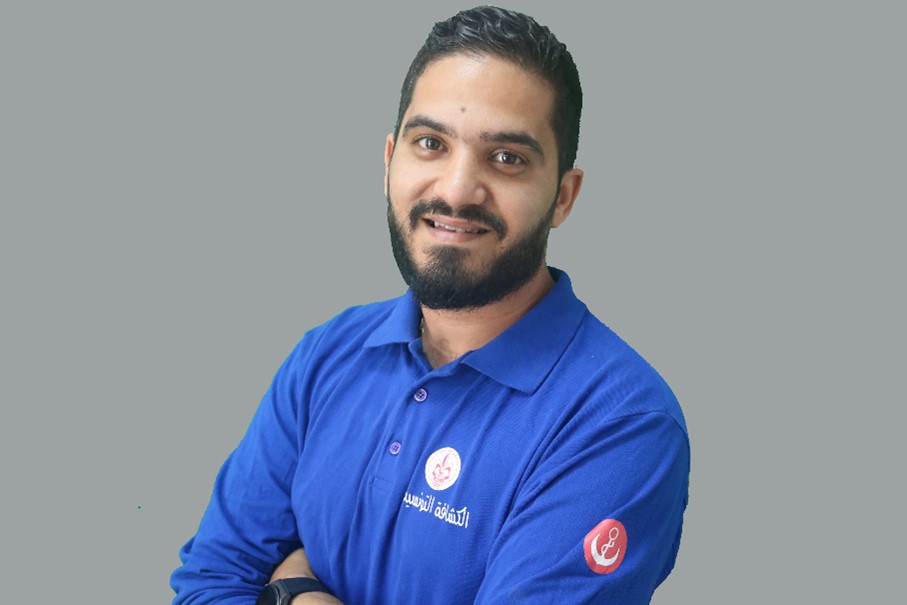
In this “new normal”, it will be incredibly important for volunteers to be regarded as essential partners right from the outset. Governments, the private sector and other stakeholders will need to commit to facilitating and accommodating the important role of volunteers. Gender issues are critical and must be addressed for the volunteers, the communities and/or organizations they will operate in, and the communities they will be assisting. Gender sensitization of all staff at all levels is imperative.
The most challenging aspect of being a volunteer is the lack of appreciation and respect. Volunteers are often expected to just follow orders and move at any command. Their contribution is often downplayed. The tasks assigned are often the ones that no one else wants to perform, or are deemed unimportant. Volunteers should be seen as an essential partner and player.
For me, the greatest satisfaction is having the opportunity to contribute to solving or ameliorating a problem that concerns people, including those outside and far from your own environment and culture. The spirit of volunteerism seems to have gone down in recent years but it is critical that it be kept alive for the sustainable development of Africa.
The psychological helpline was opened in April 2020 by the Ministry of Health, at a time when all people were locked in their homes and were trying to protect themselves and their families from the new virus that was spreading across the world.
The support we provided via the psychological helpline was motivated by desire and goodwill. We endangered ourselves, our families and many others around us to come to the aid of others. Being a psychologist in Kosovo is not easy, as there is a great lack of awareness about mental health. For this reason, we have worked very carefully to convey accurate information to people. However, I think that the work done by the psychological helpline should be further supported by institutions, along with awareness of mental health and recognition of the importance of psychologists in Kosovan society.
I often remember those times when people were totally isolated and, after a long phone call, I heard them saying "I feel much better, like a weight has been lifted off my shoulders." The feeling I experienced on the other side of the phone cannot be described in words.
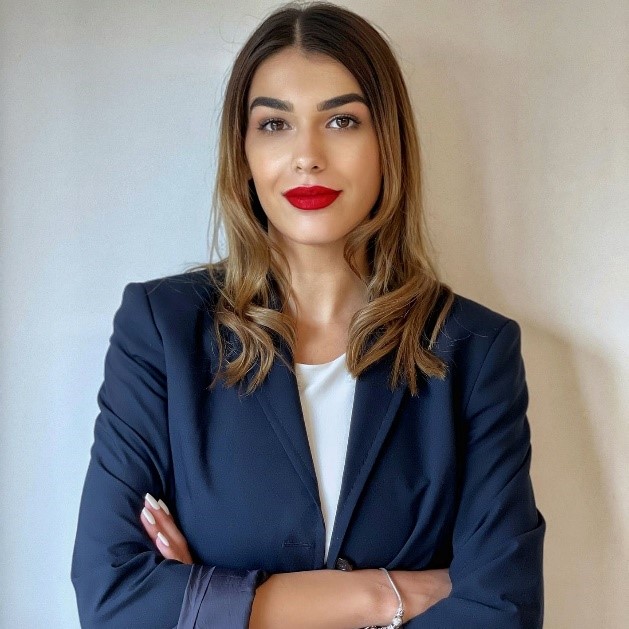
During the pandemic, many vulnerable women and children in Rajnandgaon were at risk of malnutrition as food supplies became erratic. Volunteers came up with simple, cost-effective, local solutions and raised awareness about the need to eat healthy, locally grown food and practice better hygiene. In addition, they introduced a new farming method aimed at ensuring a nutritious food supply to families even in the most remote parts of our tribal villages. For many villagers who lost their livelihoods during the pandemic, this solution also helped them save on expenses, and be more self-reliant.
The most exciting part of volunteerism has been providing support to my community and simple solutions to improve their lives. When I help raise awareness on the benefits of healthy behaviour, hygienic practices, how to overcome taboos and how to access useful government schemes, or just open up their minds to think and act with reason, I know I am helping society at large.
I feel that my journey as a volunteer has connected me better with the people in my community. I feel a sense of trust, love and respect now.
Volunteers have a role to play in creating a fairer society in rural and indigenous communities in the aftermath of the pandemic. Volunteers can support the design of policies, programmes and projects that contribute to improving the quality of life of the most vulnerable populations in social, economic, environmental, cultural and environmental issues.
Volunteering can ensure that the voices of women and the perspectives of indigenous communities are included in people-state relationships by strengthening the capacities of indigenous peoples and local communities in national and international frameworks related to the protection of traditional knowledge and the sustainable use of animal and plant life.
The most exciting aspect of volunteering has been the opportunity to contribute to the strengthening of capacities of indigenous communities, bringing government policy closer to remote territories and raising the visibility of indigenous women in the protection of biodiversity and traditional knowledge.
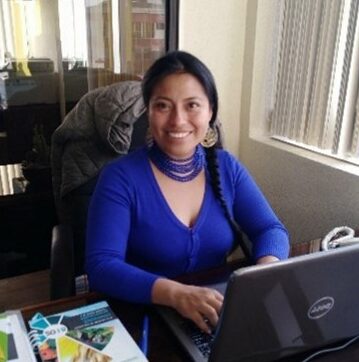
Having worked as a national volunteer with the National Centre for the Promotion of Volunteering (CNPV), I was among 60 volunteers who were selected to participate in the United Nations Community Volunteers for the COVID-19 response. As team leader, I engaged volunteers in raising awareness and informing and mobilizing communities to fight COVID-19 in public spaces by observing preventive measures. For 11 months, the volunteers worked in health centres, families, mosques, markets, community gatherings (grins) and on the streets.
In November 2020, the Ministry of Youth and Sports, which is responsible for civic education and citizenship-building in Bamako, supported a two-day awareness-raising campaign on the pandemic, launched by UNV Mali in partnership with the CNPV. As part of the campaign, thousands of people including women, young people, vulnerable people and internally displaced persons (IDPs) were reached. During the campaign’s launch, which mobilized volunteer-involving organizations and associations to raise awareness on COVID-19 prevention measures, community volunteers were commended for their commitment to COVID-19 control efforts.
Most people do not understand the importance of volunteering and the role that volunteers play in building citizenship. It is not easy to be a volunteer. As we are not full-time employees with a permanent contract, we are sometimes not respected in society because of our status. Very often, the negative opinions towards volunteers come from family, friends and acquaintances... And yet every citizen can and must contribute to building their country.
What I am most proud of is having contributed to the collective effort to fight COVID‑19. We successfully accomplished our mission because our daily activities helped to change attitudes and save lives.
I supported the state's efforts to prevent the spread of the coronavirus by volunteering at the quarantine centre in Bordj Cedria from the outset of the pandemic, often working from dawn ’til midnight. As part of efforts to prevent the spread of the virus, I was involved in disinfecting the quarantine centre, distributing food to people in quarantine, collecting hazardous materials for proper disposal by health authorities, and coordinating the placement of people in quarantine.
Volunteering during the pandemic was particularly challenging. Volunteers face difficulties in dealing with authorities and the private sector. Despite the growing reliance on the efforts of volunteers by the state, they are only perceived as service providers, not decision makers. Volunteering has many positive and negative aspects, and one of the difficult challenges we sometimes face is the lack of clear tasks and objectives for volunteers.
While the role of volunteers has been to ensure a gradual return to normal life by encouraging, guiding and educating citizens to follow proper health protocols, I feel that volunteers need to be better integrated into state institutions in order to be more efficient and active.

In this “new normal”, it will be incredibly important for volunteers to be regarded as essential partners right from the outset. Governments, the private sector and other stakeholders will need to commit to facilitating and accommodating the important role of volunteers. Gender issues are critical and must be addressed for the volunteers, the communities and/or organizations they will operate in, and the communities they will be assisting. Gender sensitization of all staff at all levels is imperative.
The most challenging aspect of being a volunteer is the lack of appreciation and respect. Volunteers are often expected to just follow orders and move at any command. Their contribution is often downplayed. The tasks assigned are often the ones that no one else wants to perform, or are deemed unimportant. Volunteers should be seen as an essential partner and player.
For me, the greatest satisfaction is having the opportunity to contribute to solving or ameliorating a problem that concerns people, including those outside and far from your own environment and culture. The spirit of volunteerism seems to have gone down in recent years but it is critical that it be kept alive for the sustainable development of Africa.
The psychological helpline was opened in April 2020 by the Ministry of Health, at a time when all people were locked in their homes and were trying to protect themselves and their families from the new virus that was spreading across the world.
The support we provided via the psychological helpline was motivated by desire and goodwill. We endangered ourselves, our families and many others around us to come to the aid of others. Being a psychologist in Kosovo is not easy, as there is a great lack of awareness about mental health. For this reason, we have worked very carefully to convey accurate information to people. However, I think that the work done by the psychological helpline should be further supported by institutions, along with awareness of mental health and recognition of the importance of psychologists in Kosovan society.
I often remember those times when people were totally isolated and, after a long phone call, I heard them saying "I feel much better, like a weight has been lifted off my shoulders." The feeling I experienced on the other side of the phone cannot be described in words.

During the pandemic, many vulnerable women and children in Rajnandgaon were at risk of malnutrition as food supplies became erratic. Volunteers came up with simple, cost-effective, local solutions and raised awareness about the need to eat healthy, locally grown food and practice better hygiene. In addition, they introduced a new farming method aimed at ensuring a nutritious food supply to families even in the most remote parts of our tribal villages. For many villagers who lost their livelihoods during the pandemic, this solution also helped them save on expenses, and be more self-reliant.
The most exciting part of volunteerism has been providing support to my community and simple solutions to improve their lives. When I help raise awareness on the benefits of healthy behaviour, hygienic practices, how to overcome taboos and how to access useful government schemes, or just open up their minds to think and act with reason, I know I am helping society at large.
I feel that my journey as a volunteer has connected me better with the people in my community. I feel a sense of trust, love and respect now.
Volunteers have a role to play in creating a fairer society in rural and indigenous communities in the aftermath of the pandemic. Volunteers can support the design of policies, programmes and projects that contribute to improving the quality of life of the most vulnerable populations in social, economic, environmental, cultural and environmental issues.
Volunteering can ensure that the voices of women and the perspectives of indigenous communities are included in people-state relationships by strengthening the capacities of indigenous peoples and local communities in national and international frameworks related to the protection of traditional knowledge and the sustainable use of animal and plant life.
The most exciting aspect of volunteering has been the opportunity to contribute to the strengthening of capacities of indigenous communities, bringing government policy closer to remote territories and raising the visibility of indigenous women in the protection of biodiversity and traditional knowledge.
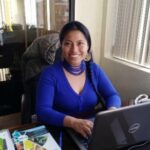
Having worked as a national volunteer with the National Centre for the Promotion of Volunteering (CNPV), I was among 60 volunteers who were selected to participate in the United Nations Community Volunteers for the COVID-19 response. As team leader, I engaged volunteers in raising awareness and informing and mobilizing communities to fight COVID-19 in public spaces by observing preventive measures. For 11 months, the volunteers worked in health centres, families, mosques, markets, community gatherings (grins) and on the streets.
In November 2020, the Ministry of Youth and Sports, which is responsible for civic education and citizenship-building in Bamako, supported a two-day awareness-raising campaign on the pandemic, launched by UNV Mali in partnership with the CNPV. As part of the campaign, thousands of people including women, young people, vulnerable people and internally displaced persons (IDPs) were reached. During the campaign’s launch, which mobilized volunteer-involving organizations and associations to raise awareness on COVID-19 prevention measures, community volunteers were commended for their commitment to COVID-19 control efforts.
Most people do not understand the importance of volunteering and the role that volunteers play in building citizenship. It is not easy to be a volunteer. As we are not full-time employees with a permanent contract, we are sometimes not respected in society because of our status. Very often, the negative opinions towards volunteers come from family, friends and acquaintances... And yet every citizen can and must contribute to building their country.
What I am most proud of is having contributed to the collective effort to fight COVID‑19. We successfully accomplished our mission because our daily activities helped to change attitudes and save lives.



